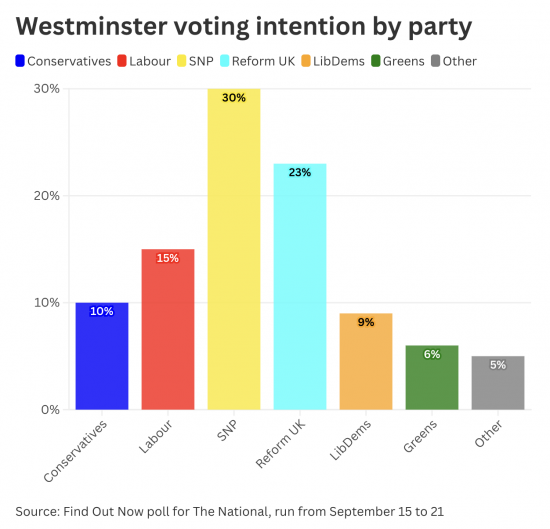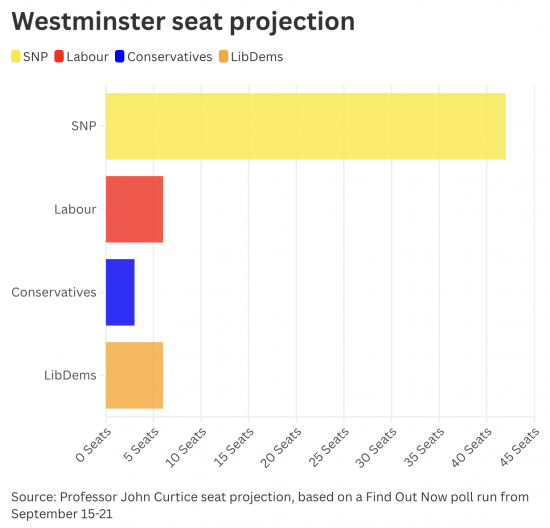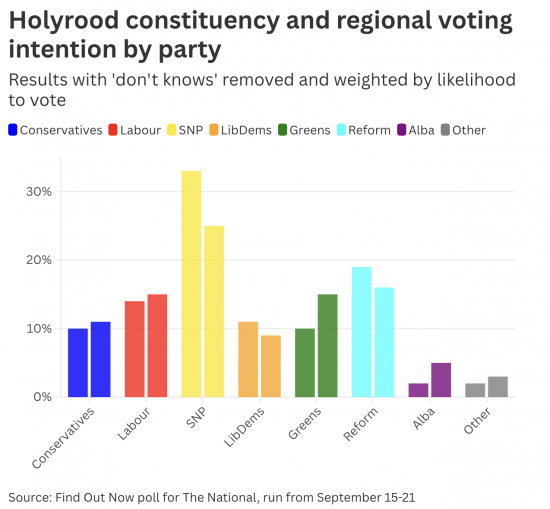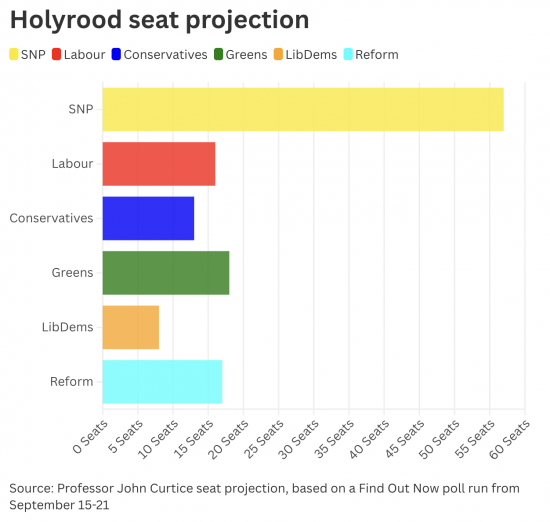As I often say, Scotland is another country. Polling data released by The National newspaper (for whom I write) reveals this.
This is the current Westminster polling intention in Scotland:

Translating that to seats wipes out most of what Labour hold:

Note that if the swing to Reform is uniform (and that seems fair), then it gets no seats, which is surprising.
Then questions were asked about voting intentions in the 2026 Holyrood elections, where there is both a constituency and a party list vote:

The left-hand column is the constituency choice, and the right-hand is the list choice: people in Scotland have learned how to use this system, not voting for the leading party in the list, as it is biased against in the list because of its position in the constituency vote, which is why the SNP vote disperses, in part.
The Holyrood result would then be:

PR pays for Reform, but the clear message is that pro-independence parties would take the majority of the seats in Holyrood.
Scotland is, then, another country. The story there is so utterly different from the rest of the UK that it can hardly be considered a part of it.
It is time Scotland was independent.
Thanks for reading this post.
You can share this post on social media of your choice by clicking these icons:
There are links to this blog's glossary in the above post that explain technical terms used in it. Follow them for more explanations.
You can subscribe to this blog's daily email here.
And if you would like to support this blog you can, here:


 Buy me a coffee!
Buy me a coffee!

I question one line: “Note that if the swing to Reform is uniform (and that seems fair)”.
I don’t think that is a reasonable assumption – the Brexit vote, the UKIP vote, the Reform vote tend to be grouped – not spread uniformly.
I guess that this might mean that Reform could do slightly better in the Westminster vote than suggested ?
But yes — a very different country with different values than have been espoused down south for many years. It wasn’t always like that. But is it now.
Th assumption was by Prof John Curtice. If he is wrong, you are right.
Interesting, thank you. Extra thanks for including graphs. I’m in Wales, and keen to find equivalent data for here.
Let me in please!
We’ll get the kettle on. Those of us who are pro-independence will happily welcome anyone who’ll help us get there.
Moving to Scotland aged 26 over 48 years ago was the best thing that ever happened to me. I have led a constructive and happy life in a peaceful and progressive country where folk will stop and talk with you when out for a daunder.
It’s the grass roots well being economy concept driving the independence vote and the SNP is the only party with enough governing experience here to run Scotland presently.
Scots have very very very long cellular generational memories of inequitable treatment from all manner of elite self interested overlords, and will not tolerate it anymore.
The evolving current voting and up coming voting population have realised that they can do much better running the show themselves in a democratic equitable sustainable well being economy managed by our own people rather than some elite or would be could be elites imposed upon us by birth or political affiliation from down south or elsewhere.
True independent self government will be returned to Scotland. It is only a matter of a short space in time now.
Richard wrote: “Scotland is, then, another country. The story there is so utterly different from the rest of the UK that it can hardly be considered a part of it. It is time Scotland was independent”.
It is indeed long past time Scotland was independent and here’s some up-to-the minute evidence of the suffocating indifference of Westminster: https://www.businessforscotland.com/westminster_knocks_out_scotland_s_rocket_launch?
utm_campaign=day_of_action_round_up&utm_medium=email&utm_source=believeinscotland
This isn’t first time an enterprising development has been kyboshed by Westminster’s failure to invest in the future. We’re still waiting for underwater cables of sufficient capacity for green energy from Orkney and the Western Isles to link to the UK grid (in Orkney’s case they’ve been waiting 25 years and still counting).
There was also the Tories’ abandonment of tidal energy funding which resulted in down-scaling of works already underway in Orkney. It might not be widely known outside of Scotland, but development went ahead anyway (albeit at a reduced rate) with the SNP and the EU funding it and the engineering companies involved continuing it. Two different projects in the Orkney Isles – one is fixed underwater turbines and the other is floating surface turbines – are already producing 24/7 green energy. After local testing, the prototype floating vessel went the Bay of Fundy for stress testing in the planet’s biggest tidal races (a rise and drop of 16 metres). The extreme ferocity of the Bay’s tidal races has been very challenging and contradictory reports have resulted, but meantime in the Orkneys both types of turbine are operating successfully.
We’ve also seen Grangemouth oil refinery being closed recently by Petroineos and PetroChina on the grounds that there are plenty of more efficient refineries elsewhere in the world, but where does that leave Scotland/UK’s fuel resilience in times of increasing international tension? Westminster’s short-sightedness and economic ignorance is in nobody’s interest but, put simply, Scotland can’t afford to remain in the UK.
As you know, I very strongly agree.
Yes Richard your support for Scottish Independence is much valued here, so apologies if you’re already aware of a development last Friday (18th Sept) which evaded all the UK media except the National.
Two Scottish organisations, Liberation Scotland and Salvo, which are not directly affiliated to any pro-Independence political parties, took a case to the European headquarters of the United Nations in Geneva claiming that the 1707 Treaties of Union were not a voluntary partnership, but rather a colonisation of Scotland by England. They sought UN agreement to list Scotland as a non-self-governing territory and to refer Scotland’s case to the International Court of Justice for investigation and a ruling on its constitutional status.
How this will play out remains to be seen, but a couple of points arise: in the absence of any serious SNP plan for independence, it’s encouraging to see a movement by the people, given that Scots Law defines sovereignty as lying with the people of Scotland, not with the monarchy or political parties. Its success will likely depend on legal definitions of colonialism, but I was astonished, but in retrospect not surprised, to find that Scotland already ticks so many boxes for accepted definitions of colonialism.
If the case is found proven, it would mean that England/UK would have no legal right to prevent secession from the Union by Scotland provided a demonstrable majority of the electorate vote in favour of secession in a properly organised referendum.
I have been following this, with hope.
It’s comin’, for a’ that. The English don’t have any understanding of it, nor do they want to. They want to cling onto Scotland – their last significant colony – mostly because, without it, they will find themselves alone for the first time in a very long time and they have no idea how to handle that, how to deal with the endless class-war that defines England.
Thank you for the articles in the National – I’ve just re-upped my subscription and enjoy the pieces you and other democrats write there.
Thanks Bill
I am also a subscriber
Just out of curiosity, is there any polling on English attitudes to Scottish independence? Most people I know are quite relaxed about the idea and basically happy to leave it up to the Scots. Outside the Tory party I don’t see why anyone would be implacably opposed except for short term political reasons but maybe I move in atypical circles.
From Google:
Public opinion polls from 2024 and 2025 indicate that a majority of people in England would prefer for Scotland to remain part of the United Kingdom. However, English public attitudes on this issue have become more complex, with a significant number expressing indifference or feeling that it is a decision for Scots to make.
Key findings from polling include:
A majority prefer the Union: A September 2024 YouGov survey found that 68% of English adults want Scotland to remain in the Union, with only 15% preferring Scottish independence.
Shift toward indifference: A growing portion of the English population either has no strong opinion or believes it is a matter for the Scottish people to decide. A YouGov poll from 2020 showed that 34% of English people considered it a matter for Scotland to decide.
Pleasure at departure: Some English people would be “pleased” to see Scotland leave. A 2020 YouGov survey found this sentiment was most common among Conservative voters, with one in five saying they would be happy to see Scotland leave the UK.
Lower enthusiasm among the young: A September 2024 YouGov poll revealed that support for the Union is lowest among young people in England, though most still oppose independence.
Factors influencing English attitudes
Economic considerations: In a 2020 YouGov poll, nearly half of English adults felt that the UK would be financially better off if Scotland became independent. Conversely, arguments have been made that the integrated UK economy is a benefit to both nations.
Political frustration: Some English voters, particularly certain Conservative voters, express a sense of frustration with the ongoing constitutional debate initiated by the Scottish National Party (SNP).
Security concerns: Arguments have been made that the UK’s defense capabilities, including its nuclear deterrent, benefit from Scotland’s continued membership. Concerns exist over the potential for an independent Scotland to weaken the UK’s defense posture.
Emotional ties: Many English people feel strong cultural and family ties to Scotland, celebrating their joint history and achievements.
Scottish opinion
Scottish opinion remains closely divided on the question of independence, with recent polls showing a slight lead for either side, indicating no decisive shift since the 2014 referendum. Recent polling conducted for The National in September 2025 found 52% of Scots would back independence versus 48% who would vote ‘No’. Other recent polls show a lead for ‘No’.
The graphs add nice visual information. I keep wondering where the policies are from Reform. They never talk about how they are going to make the UK a better country and improve the lives of the people.